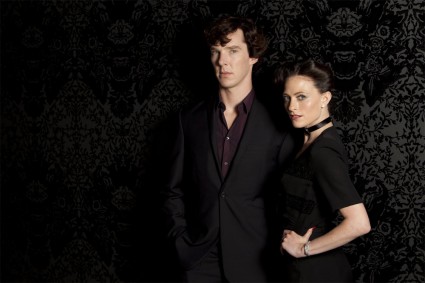 “Well, wow.” That’s pretty much all I could think about regarding the Sherlock premiere after I watched it. Wow, and “I have no idea what just happened, but I’m pretty sure it was awesome.” Unfortunately, that is not really a good place to start if you’re trying to review a show. Fortunately, fellow Clacker Katie was game to talk this episode out with me.
“Well, wow.” That’s pretty much all I could think about regarding the Sherlock premiere after I watched it. Wow, and “I have no idea what just happened, but I’m pretty sure it was awesome.” Unfortunately, that is not really a good place to start if you’re trying to review a show. Fortunately, fellow Clacker Katie was game to talk this episode out with me.
Katie: I am so glad they resolved the cliffhanger from the last series. It’s not how I expected it to be, but it’s pure Moriarty.
Julia: It’s so impossible for me to choose a favorite moment of the episode, but definitely in the top ten is the fact that Moriarty’s ringtone is “Stayin’ Alive“. And Andrew Scott is just so damn good as Moriarty. He reminds me a lot of Heath Ledger‘s version of the Joker, actually. He’s clearly terrifying and dangerous, but in that completely unbalanced, sickly-sweet way that taps into this really childlike terror so much better than someone who was just cold and competent ever could.
Katie: I totally agree about Moriarty. My favorite moment of last season was his indescribable, “NO YOU WON’T!” Very, very Joker-like. He’s such a great foil for Sherlock because Sherlock is so very dry while Moriarty is the definition of manic.
Now, what did you think of Irene (Lara Pulver)? Because I’m on the fence about her.
Julia: I loved Irene. I’ve seen a lot of people on the fence about her, but mostly it wasn’t because they didn’t know if they liked her so much as they were angry about the anti-feminist message. Basically, their argument is that in the original books, Irene is “The Woman” because she’s the one who teaches Holmes that you can’t underestimate someone just because of their gender, and she is the first woman (and arguably, the only woman) that Holmes ever respects. Which is pretty progressive, considering when Arthur Conan Doyle wrote the books. So people argue that because Irene was in league with Moriarty and not acting on her own agency, and because she was in love with Holmes (and making Holmes be a mighty, mighty man who was able to make a lesbian suddenly not a lesbian), Steven Moffat basically shafted one of literature’s great feminist characters.
I’m not sure I agree with that. I think that Irene still totally dominated (pun only semi-intended) everyone. She outsmarted Mycroft (not an easy thing to do), she initially was the one who saved John and Sherlock in the swimming pool, and I see her bringing in Moriarty less as needing him and more as being a resourceful woman who has no scruples about using every weapon in her arsenal to get what she wants, no matter how unsavory that weapon is. And as for her being in love with Sherlock, I’m not sure I believe she was so much as I believe that Sherlock is arrogant and close-minded when it comes to emotion enough to believe she was. I saw their relationship in this episode less as a sexual one and more as a mutual intellectual obsession. Sherlock’s admitted to being lonely before, or feeling constantly bored, and Irene is the first and only person who is capable of challenging him in that capacity, and probably the same goes for her. So when Sherlock feels for her pulse and notices her excitement, of course he dismisses it as arousal and arrogantly assumes she’s in love with him, because he’s full of himself and emotionally stunted, and when something happens that he doesn’t understand he dismisses it as having to do with love or sex and therefore being a trite weakness.
I mean, it’s still Moffat, and his track record is pretty abysmal when it comes to women, so he probably intended Sherlock to be right and for Irene to be really in love with him instead of them just sharing a deep intellectual bond. But to his credit, what he wrote was well-crafted and ambiguous enough that you could at least make a compelling argument against him being a sexist prick.
I’m so glad that someone has articulated why the character of Irene Adler is not the feminist anathema that she has been portrayed as in several media articles. She managed to hoodwink both Mycroft and Sherlock after all.
I found this episode of Sherlock illuminating in it’s portrayal of the eponymous hero’s flaws: his emotional immaturity, his lack of perception when it comes to understanding emotions and the holes in his “infallibility”. In particular, it referenced the cases he didn’t solve and the fact that Irene pulled the wool over his eyes several times in this episode.
I think that they played up the “romance” and emotional aspects of the Irene Adler story to show his more human side. Possibly, to set up a plotline later on.